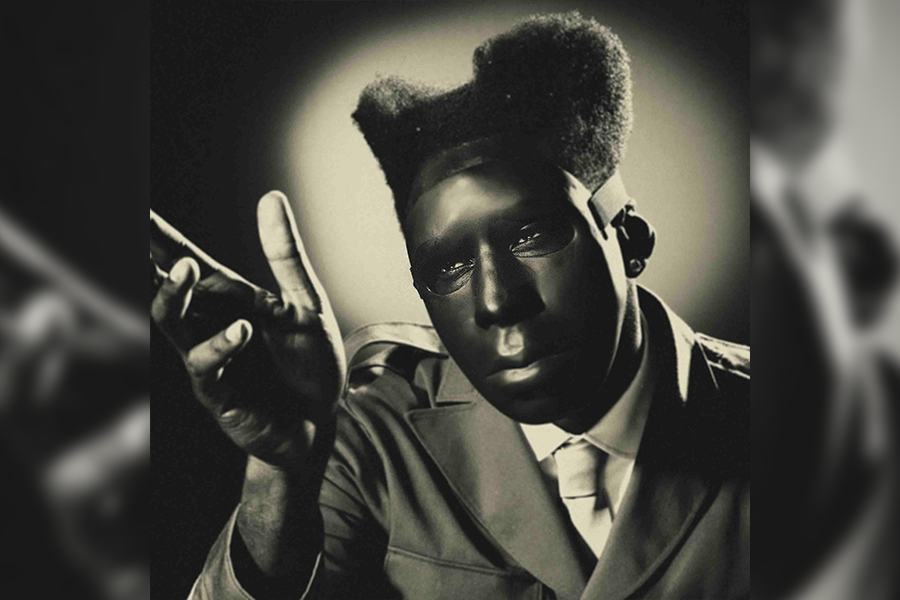Tyler Okonma, known as Tyler, The Creator, is an alternative hip-hop artist from Los Angeles. Raised by his mother, Bonita Smith, after his father left before his birth, Tyler founded the music collective Odd Future in the late 2000s. He made his solo debut with “Bastard,” followed by “Goblin” and the hit single “Yonkers.” Despite early controversies, his music evolved with critically acclaimed albums like “Wolf,” “Cherry Bomb,” “Flower Boy,” “Igor,” and “Call Me If You Get Lost,” with the latter two winning Grammy Awards. Known for his fashion sense, Tyler released his eighth studio album, “CHROMAKOPIA,” on October 28th, accompanied by a nearly 100-concert world tour.
St. Chroma (Ft. Daniel Caesar)
“St. Chroma” was first teased in a music video where Tyler, wearing a black mask, leads a group through a dull desert to a shipping container labeled “CHROMAKOPIA.” Upon entering, a figure (likely Tyler) detonates the container, bringing color to the landscape. The album opens with Tyler’s mother encouraging him not to “dim your light for nobody,” setting a reflective tone, with the theme of “light” recurring in the chorus. In the last verse, Tyler questions whether to continue his career or step back from the spotlight. 4/5
Rah Tah Tah
“Rah Tah Tah” is the album’s most chaotic track, filled with jabs at celebrities and showcasing Tyler’s ego regarding wealth and fame. It opens with, “She ain’t never met anyone who talk like that,” referencing the rap feud between Drake and Kendrick. Tyler mentions “never in the Hamptons d***-ridin’ in a white ‘fit,” alluding to Sean “Diddy” Combs’ arrest. Other names referenced include Zendaya and Usher. Beneath the aggressive beat lies paranoia, ending abruptly with “I’m.” 4.5/5
Noid
“Noid” stands out, marked by a snippet released before the album drop. It opens with “Paranoid,” continuing the thematic tone. The music video shows Saint Chroma facing a hostile crowd. The juxtaposition, with a woman turning her phone into a gun, emphasizes his paranoia about fans. Tyler samples “Nizakupanga Ngozi” by the Ngozi Family, reflecting his disdain for media attention. When translated from Nyanja to English, it roughly means, “When you come at my house, please be respectful. Because I don’t like talking too much.” He raps about checking locks and peeking through curtains, echoing his mother’s advice: “Don’t trust these people out here.” 4.8/5
Darling, I (Ft. Teezo Touchdown)
“Darling, I” explores Tyler’s struggles with love and monogamy, featuring a higher-pitched, melodic tone with vocal support from Teezo Touchdown. He expresses dissatisfaction with commitment, noting that he might feel unfulfilled even at his wedding. He questions, “How can I get everything from one person?” He critiques modern dating, stating, “But when that grey hair finally come, at least I felt somethin’… Nobody could fulfill me like this music s*** does.” Music remains his true refuge throughout. 3.7/5
Hey Jane
“Hey Jane” follows Tyler as he grapples with the surprising news of an unexpected pregnancy, leaving him in shock. He grapples with his commitment issues and realizes his problems are minor compared to his partner’s. He tells Jane, “Who am I to come b**** and complain?” and offers support saying, “Just know I’ll support either way, no pressure.” The song ends with his mixed feelings about potential parenthood and cleverly references a New York reproductive telehealth clinic called “Hey Jane.” 4.4/5
I Killed You
“I Killed You” addresses Tyler’s struggles with his hair and his insecurities. He states, “Your natural state is threatening,” and tries various methods to get his hair to obey: “I burnt you, I cut you, I filled you up with chemicals.” Despite efforts, he realizes the beauty of his hair culture. The song concludes with Childish Gambino singing, “You’re so beautiful. I didn’t mean to,” marking Tyler’s appreciation for his roots. 3/5
Judge Judy
“Judge Judy” is a play on words related to the reality court show, but the story takes a different route. Tyler meets Judy in a coffee shop, feels an immediate connection, and they have fun together. Despite her past with other men, he says, “So I won’t judge Judy.” Their casual relationship ends tragically when Tyler receives a letter revealing Judy has been battling cancer: “This past year has been rough, it spreaded to my head.” Stricken with grief, he concludes, “I’m wishing you the best, P.S. Thank you for not judging, Judy.” 4.4/5
Sticky (Ft. GloRilla, Lil Wayne & Sexyy Red)
“Sticky” quickly became a hit. The song features a light-hearted tone as Tyler, Lil Wayne, and Sexyy Red emphasize staying true to themselves. Tyler discusses his carefree attitude amid challenges, supports the LGBTQ+ community, and hints at a struggle for recognition. He celebrates his newfound fame, proclaiming, “Ahead of ya, I’m better, baby, check the vehicle” and “I can fit ten hundred thousand in these trousers.” 4.7/5
Take Your Mask Off (Ft. Daniel Caesar & LaToiya Williams)
“Take Your Mask Off” examines the masks people wear. Tyler criticizes a hypocritical pastor who condemns homosexuality while hiding his true self and reflects on a stay-at-home mom who feels trapped in her life. He also shares his own struggles, singing, “And I hope you find yourself. And I hope you take your mask off.” He urges listeners to “Take that mask off and tell ’em the truth, let’s talk about it,” indicating his readiness for self-revelation. 4/5
Tomorrow
“Tomorrow” starts with Tyler’s mom asking for a grandchild, setting a familial tone. He shares his fears of aging, stating, “These jet black strands are turning gray. I’m gaining weight; I’d rather rest.” He contrasts his life with his friends’ marriages, ending with, “But don’t you wait on me; I’ll be fine,” reflecting his procrastination about settling down. 4.4/5
Thought I Was Dead (Ft. Santigold & ScHoolboy Q)
In “Thought I Was Dead,” Tyler critiques modern pop culture and his feelings of being overlooked. The repeating chorus emphasizes his sense of being forgotten. He contrasts his tough upbringing with misconceptions about his background and reflects on past controversies, noting, “See, T changed like the ‘fit got dirty.” He expresses disdain for the industry’s fakeness and the judgment he faces from fans. 4/5
Like Him (Ft. Lola Young)
“Like Him” is a self-exploration where Tyler confronts the impact of his absent father. He recalls his mother saying he resembles his dad, leading to his disdain for the man who abandoned them. He asserts, “I’m everything that I’ve strived to be. So do I look like him?” Despite personal achievements, he worries about his father’s potential pride, concluding, “It was my fault, not yours, not his, it was my fault, I’m sorry,” illustrating his internal struggle and self-blame. 4.2/5
Balloon (Ft. Doechii)
In “Balloon,” Tyler reflects on his success and shares his unique perspective on life. He asserts that money doesn’t equate to being cool, emphasizing his work ethic with, “Why I work so hard? My soul profit. Why I can’t settle down? I like options.” He critiques societal issues like plastic surgery and superficiality, while the song’s energetic style paired with Doechii’s lighter vibe creates an empowering anthem. Tyler declares, “I’ll air this b**** out like balloon,” showcasing his desire to uplift those around him, encouraging listeners to embrace their true selves. 3.7/5
I Hope You Find Your Way Home
“I Hope You Find Your Way Home” poignantly concludes Tyler’s album as a follow-up to “Hey Jane.” Here, he grapples with impending fatherhood, stating, “I’m slippin’, I need a hand,” and expressing his reluctance with, “raisin’ a child is not on my wish list.” Despite remaining substance-free, he acknowledges the weight of societal expectations. Tyler concludes with self-affirmation: “I’m proud of you, bro… There’s no words right now how I feel,” triumphing with, “The light comes from within,” as he embraces his journey and passion. 4.6/5
CHROMAKOPIA is a unique album that marks a new direction for Tyler in terms of lyricism, tone, and content. Its dark, monotone music videos recall his earlier works like “Bastard” and “Goblin.” Notably, Tyler experiments with a higher-pitched singing voice, contrasting with his typical lower tone. This blend of light and dark, depressed and uplifting, leaves the listener in an introspective state merely through its beat and imaging.
In this album, he candidly addresses his shortcomings in modern dating culture, expressing a fear of commitment influenced by past losses, such as his father’s absence. He also shares his struggles with “daddy issues,” which affect his relationships and feelings about starting a family. An unexpected pregnancy adds to his dilemma, as he wants to support the mother but grapples with his commitment fears.
Tyler’s paranoia stems from constant media and fan scrutiny, making him anxious about public outings. This pressure leads him to withdraw from interactions, resulting in feelings of isolation and impacting his mental well-being.
In summary, CHROMAKOPIA is an impressive work that appears to be guiding Tyler toward a fresh artistic direction. I highly recommend giving it a listen—it’s a unique exploration for him and a notable evolution in his music.




